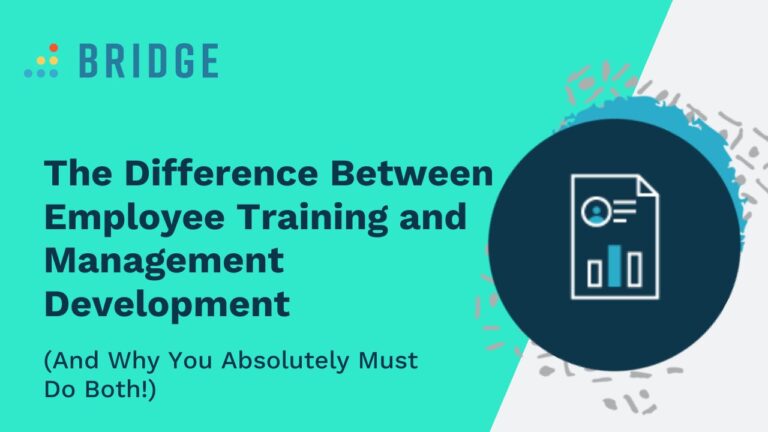Employee training and management development are both important for the success of your people. Read on to discover the differences between them and why you need both.
What does learning and development mean to you? If your answer focuses only on benefits to your employees as they learn new skills and how to perform better in their roles, then you might be missing another huge benefit.
Developing your managers makes good business sense. Think of it as like fine-tuning an engine–ensuring that managers have the skills they need to communicate and engage with employees will mean that all parts of your business machine work in harmony.
Managers want L&D, too. A recent study found that half of managers want to participate in development programs in the future. The enthusiasm is there and it’s up to you to make the best use of it! Manager development means better managers who are therefore better able to realize your business goals. But before you invest in development opportunities for your managers, it’s good to be clear about the differences between training your employees and developing your managers.
What’s the Difference Between Employee Training and Management Development?
A good business strategy needs to have a strong focus on training and development at all levels of seniority within your organization. Training your employees and developing your management are both important and should go hand-in-hand. That said, there are also some distinct differences between them and your approach to each should be tailored to their distinct requirements.
Let’s look at how employee training and manager development differ:
1. Short-Term Goals vs Long-Term Goals
Employee training is often needed to solve a current problem in the workplace. If there’s a skill or competency your employee is lacking and their job isn’t being done as well as it ideally should be, then that’s an immediate issue that needs addressing. To tackle this, your company may well deliver training or have them enroll in a course. Once that training is complete, the employee will be able to perform better in their role. Job done!
Development, on the other hand, looks at behaviors and skills that will be used going forward and is much more of an ongoing process.
2. Specific Objectives vs Open Objectives
Employee training focuses on developing a specific skill. Say, for example, one of your employees needed to complete compliance training or they wanted to improve their digital skills, then they’d complete training in that area by taking a course in your learning management system. The route by which your employee learns that skill is well-defined, finite, and doesn’t need adapting to the individual.
Manager development is a little different—it focuses on transforming their mindset and enables them to better lead your employees. As each person’s mindset is different and each person has their own strengths and weaknesses, manager training means you’re addressing the individual to a much greater extent. Some managers may need to improve skills like communication, others might need to improve their conflict resolution or positivity. Manager development can address all these issues and will clearly be an ongoing process.
3. Performance Metrics vs Employee Engagement Metrics
Since employee training often involves acquiring a hard skill, measuring the success of your training is simple. Once the employee has successfully completed the training, they can pass a test or use that skill to great effect in their job. With employee training, you can see the results almost immediately.
Manager development is, again, a little different, since the skills being acquired are often soft skills. The effects of that development will be over a much longer timeframe and will be measured in how that manager communicates with and relates to other employees. The measure of success, in this case, will be in engagement surveys and feedback from your employees.
4. Job Position vs Career Trajectory
Short-term training is designed for specific jobs and skills and is often needed to address a particular technical shortcoming. Development, on the other hand, is centered on the person and how they can gain the skills they need to move forward in their career. The focus is different: employee training will often be a requirement of the company, whereas manager development may be tied to that manager’s desire to follow a particular career trajectory.
MORE FROM THE BLOG | ‘Putting People First: Why Creating an Employee-First Culture Matters’
Why Does Management Development Matter?
Being a manager carries a lot of responsibility, not only to the company as a whole but to the employees they manage. Managers are on the front line of your business. They’ll have an in-depth knowledge of the challenges facing your employees and the concerns that they have. Successful managers will have a pivotal role in engaging with your teams—they will need to motivate those teams and address problems that arise and keep people on the right track.
As the challenges they face are ongoing, their development should be too. Management development is an essential support system for your managers, helping them to develop and refine their skills to deal with future challenges.
Three Reasons to Invest In Developing Your Managers:
1. Managers Influence Employee Performance
You can’t overestimate the importance of good management, as managers have an overwhelming impact on their teams. A Gallup study found that they influence at least 70% of your employees’ engagement and a manager’s outlook and behavior can make or break their teams’ attitudes. That’s why investing in management development makes good sense. Developing one person can positively impact the work of many more. If you aren’t giving your managers the opportunity to develop and be the best they possibly can be, then you’re potentially losing out on company-wide improvements.
2. Development Programs Make Better Managers
Focused and personalized development programs for your managers will strengthen their abilities and make them far more effective in the workplace. It’s not a one-time deal though! That’s because better managers should be nurtured by giving them the ongoing support and development opportunities they need to adapt to the ever-changing needs of their team.
3. Futureproofing Your Business
Developing your managers to be flexible, innovative, and proactive means that your business is in a great position to weather any future challenges and adapt to evolving market conditions. A well-trained, well-educated management team is one of the linchpins of your success and will be an essential line of communication between you and your employees. If there are any changes in the engagement or performance levels of your workforce, they will be the first to know and you’ll be able to take appropriate steps to ensure your business remains on track.
WANT TO DEVELOP EFFECTIVE LEADERS? GET THIS GUIDE | ‘Leadership Development for Millennials’
How to Support Training and Development In the Workplace
No matter the employee or what they’re learning, tracking learning and development is the basis for success.
In an ever-changing business environment, giving your people access to the right training and development helps to create a skilled workforce and help them progress within their roles. It may seem obvious but it’s important that you know what that training and development should be. That means you must always be aware of skills gaps and development needs within your workforce and not leave their discovery to infrequent appraisals.
Performance conversations should be ongoing, not just a once yearly deal. By offering ongoing feedback, your learners are more likely to see the value in what they’re doing and be able to apply it to their roles. It’s also a good opportunity to see what’s working and what isn’t.
WANT TO KNOW MORE ABOUT TRACKING LEARNING? READ IT HERE | ‘Delivering Results: The Importance of Tracking Employee Learning’
How Can Bridge LMS Help?
To achieve the learning you want, you need the right tool. Bridge’s Learning Management System gives your people the freedom and flexibility to take control of their own learning needs, refine their skills, and advance in their careers.




